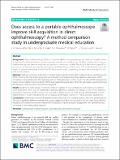Does access to a portable ophthalmoscope improve skill acquisition in direct ophthalmoscopy? A method comparison study in undergraduate medical education
Date
13/06/2019Metadata
Show full item recordAbstract
Background: Direct ophthalmoscopy (DO) is an essential skill for medical graduates but there are multiple barriers to learning this. Medical students and junior doctors typically lack confidence in DO. Most students do not own an ophthalmoscope and learn via ward devices that vary in design and usability. The Arclight ophthalmoscope (AO) is an easy to use, low-cost and portable device that could help address device access. This study aimed to assess the impact of personal ownership of an AO on DO skill acquisition and competency amongst medical students in the clinical environment. Methods: Method comparison study with 42 medical students randomised to either traditional device ophthalmoscope (TDO) control or AO intervention group during an 18-week medical placement. Three objective assessments of DO competency were performed at the beginning and end of the placement: vertical cup to disc ratio (VCDR) measurement, fundus photo multiple-choice questions (F-MCQ) and model slide examination (MSE). DO examinations performed during the placement were recorded via an electronic logbook. Results: Students in both groups recorded a median number of six examinations each during an eighteen-week placement. There was no statistically significant difference between the groups in any of the objective assessment measures (VCDR p = 0.561, MCQ p = 0.872, Model p = 0.772). Both groups demonstrated a minor improvement in VCDR measurement but a negative performance change in F-MCQ and MSE assessments. Conclusions: Students do not practice ophthalmoscopy often, even with constant access to their own portable device. The lack of significant difference between the groups suggests that device access alone is not the major factor affecting frequency of DO performance and consequent skill acquisition. Improving student engagement with ophthalmoscopy will require a more wide-ranging approach.
Citation
Gilmour-White , J A , Picton , A , Blaikie , A , Denniston , A K , Blanch , R , Coleman , J & Murray , P I 2019 , ' Does access to a portable ophthalmoscope improve skill acquisition in direct ophthalmoscopy? A method comparison study in undergraduate medical education ' , BMC Medical Education , vol. 19 , 201 . https://doi.org/10.1186/s12909-019-1644-5
Publication
BMC Medical Education
Status
Peer reviewed
ISSN
1472-6920Type
Journal article
Collections
Items in the St Andrews Research Repository are protected by copyright, with all rights reserved, unless otherwise indicated.

